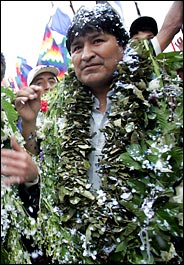Evo Morales donned wreaths of coca leaves at a campaign rally earlier this month in the Chapare region of Bolivia. And like thousands of other coca farmers in this verdant, tropical region of central Bolivia, Mr. Torrico has refused to stop growing coca, the main ingredient in cocaine, even in the face of a relentless United States-financed effort to stamp it out.
Now, after years of persistence, he and his fellow farmers say they are eagerly anticipating the advent of a new era, one in which growing coca will finally be made legal. That is, they say, if Evo Morales is elected president on Dec. 18.
"It will be legalized," Mr. Torrico, 69, said with a broad smile as he showed off an orange nylon tarp loaded with freshly picked coca leaves. "This is good for us. Evo can do us favors."
Source:

Source: Noah Friedman-Rudovsky for The New York Times - 11/26/05